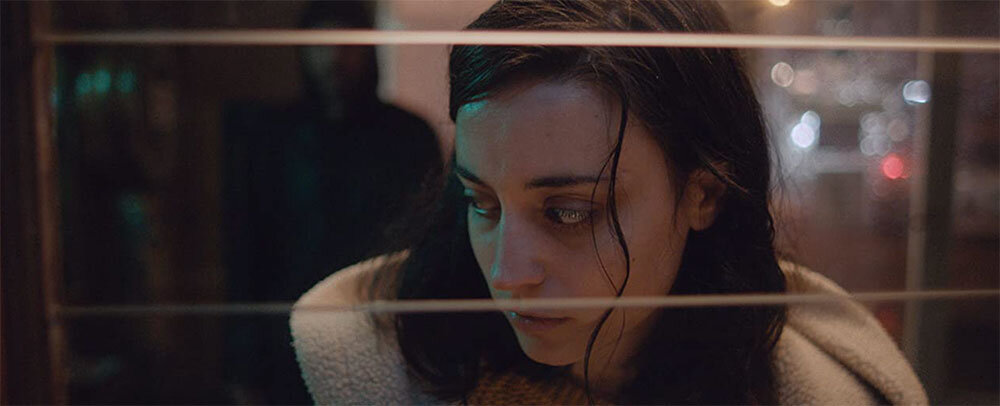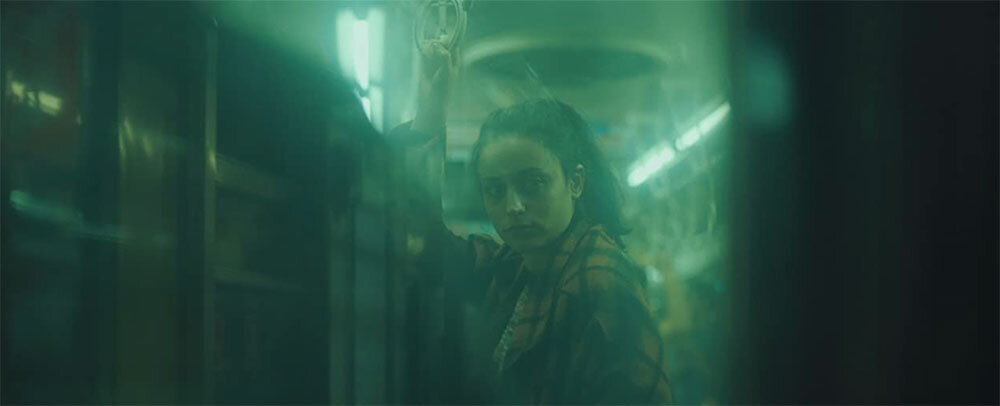[Film Review] Leni (2020)

The deeper we bury our grief, loneliness, and anxiety, the more powerful our monsters become. This is the idea that is explored in Leni, the indie festival darling out of Argentina, written and directed by Federico Gianotti.
Leni is a woman beset by suffering. We meet her in an empty apartment, wailing in angst on the floor, faint traces of blood on her hands, broken glass scattered all around her. From her scream, the scene abruptly cuts to the darkness of woods at night, with Leni being dragged by an unseen figure to a muddy grave. When she awakens in her bed, she experiences the first of many hallucinations before violently vomiting mouthfuls of dirt. It is made clear early on that Leni, and the audience, shouldn’t trust what she believes she is experiencing. Rest is made impossible by terrifying images that present more as hypnagogic hallucinations than deep sleep nightmares.
Her doctor alludes to stress as the cause of her problems. Her mother has recently passed and she and her boyfriend, Martin, have also split up. The doctor suggests finding a way to relax, take her mind off her troubles, but Leni only wants a short-term solution. The sleeping pills she is prescribed barely help, and she is confronted with more waking nightmares as well as what she assumes to be the persistent harassment of her ex.

Leni is filled with abrupt and jarring transitions as well as piercing diegetic sound over the hypnotic, droning score. These details make sure the audience maintains the same sense of unease and confusion as Leni, as she discovers invasive muddy footprints in her house, a hidden trunk that carries the memories of horrible family secrets, and the overwhelming sense that Leni is never truly safe, and never truly alone.
Ultimately, this is a film that examines the effects of the past on our present, the heartbreak of unearthing long hidden truths, and the damage that is done to the body and mind no matter how hard one tries to move on. It is painful to watch, because it is so familiar. Leni has a beating, broken heart, one that Ailín Zaninovich portrays with bold and unwavering abandon. She moves through her world with the strength of a survivor, but her eyes betray her exhaustion. And honestly, those exhausted eyes are that of many, many women.
At one point in the film, Leni breaks down and visits a therapist. There she admits that she knows her nightmares aren’t real, but she is scared of them anyways. She says she doesn’t want to get used to them. She doesn’t want to get used to changing the locks, or taking self-defense classes, or being alert, just in case someone shows up. She says, “I don’t want to die in fear.”

Most women, exhausted from these very thoughts that are forced into our brains every day, will take a deep breath as she says these words. This confession is one of the most powerful moments in the film. It is an expression of vulnerability that no woman wants to utter out loud, but that every woman at one point will internalize. Leni’s suffering is a long line tethered to her past, it is an invisible mark that, in her eyes, leaves her open to abuse at the hands of the men in her life as she confesses to her sister that she sees her relationship with Martin as mirroring her mother and father’s. She reacts to the things that are happening to her with, at some moments, a numb detachment and, at other points, overwhelming embodiment.
While so much of Leni focuses on her journey of traversing the terrors that may or may not be only in her mind, it certainly doesn’t relish in her angst. The viewer slowly begins to see things that Leni doesn’t, and comes to realize that Leni might have more power over the events taking place than she even understands.
Leni holds a stunning performance by its lead and a haunting sadness that permeates throughout. It captures the dread of making a wrong decision, the futility of forgiveness, and depths to which our minds can go when facing the looming darkness of truth.



RELATED ARTICLES
If you know me at all, you know that I love, as many people do, the work of Nic Cage. Live by the Cage, die by the Cage. So, when the opportunity to review this came up, I jumped at it.
When V/H/S first hit our screens in 2012, nobody could have foreseen that 11 years later we’d be on our sixth instalment (excluding the two spinoffs) of the series.
When someone is in a toxic relationship, it can affect more than just their heart and mind. Their bodies can weaken or change due to the continued stress and unhappiness that comes from the toxicity.
If you can’t count on your best friend to check your teeth and hands and stand vigil with you all night to make sure you don’t wolf out, who can you count on? And so begins our story on anything but an ordinary night in 1993…
The best thing about urban legends is the delicious thrill of the forbidden. Don’t say “Bloody Mary” in the mirror three times in a dark room unless you’re brave enough to summon her. Don’t flash your headlights at a car unless you want to have them drive you to your death.
A Wounded Fawn (Travis Stevens, 2022) celebrates both art history and female rage in this surreal take on the slasher genre.
Perpetrator opens with a girl walking alone in the dark. Her hair is long and loose just begging to be yanked back and her bright clothes—a blood red coat, in fact—is a literal matador’s cape for anything that lies beyond the beam of her phone screen.
Filmed on location in Scotland, Ryan Hendrick's new thriller Mercy Falls (2023) uses soaring views of the Scottish Highlands to show that the natural world can either provide shelter or be used as a demented playground for people to hurt each other.
GHOULS GANG CONTENT

EXPLORE
Now it’s time for Soho’s main 2023 event, which is presented over two weekends: a live film festival at the Whirled Cinema in Brixton, London, and an online festival a week later. Both have very rich and varied programmes (with no overlap this year), with something for every horror fan.
In the six years since its release the Nintendo Switch has amassed an extensive catalogue of games, with everything from puzzle platformer games to cute farming sims to, uh, whatever Waifu Uncovered is.
A Quiet Place (2018) opens 89 days after a race of extremely sound-sensitive creatures show up on Earth, perhaps from an exterritorial source. If you make any noise, even the slightest sound, you’re likely to be pounced upon by these extremely strong and staggeringly fast creatures and suffer a brutal death.
If you like cults, sacrificial parties, and lesbian undertones then Mona Awad’s Bunny is the book for you. Samantha, a student at a prestigious art university, feels isolated from her cliquey classmates, ‘the bunnies’.
The slasher sub genre has always been huge in the world of horror, but after the ‘70s and ‘80s introduced classic characters like Freddy Krueger, Michael Myers, Leatherface, and Jason, it’s not harsh to say that the ‘90s was slightly lacking in the icon department.
Mother is God in the eyes of a child, and it seems God has abandoned the town of Silent Hill. Silent Hill is not a place you want to visit.
Being able to see into the future or back into the past is a superpower that a lot of us would like to have. And while it may seem cool, in horror movies it usually involves characters being sucked into terrifying situations as they try to save themselves or other people with the information they’ve gleaned in their visions.
Both the original Pet Sematary (1989) and its 2019 remake are stories about the way death and grief can affect people in different ways. And while the films centre on Louis Creed and his increasingly terrible decision-making process, there’s no doubt that the story wouldn’t pack the same punch or make the same sense without his wife, Rachel.






















![[Film Review] Sympathy for the Devil (2023)](https://images.squarespace-cdn.com/content/v1/5fe76a518d20536a3fbd7246/1697186986143-QDVLQZH6517LLST682T8/Screenshot+2023-10-13+at+09.48.52.png)
![[Film Review] V/H/S/85 (2023)](https://images.squarespace-cdn.com/content/v1/5fe76a518d20536a3fbd7246/1697455043249-K64FG0QFAFVOMFHFSECM/MV5BMDVkYmNlNDMtNGQwMS00OThjLTlhZjctZWQ5MzFkZWQxNjY3XkEyXkFqcGdeQXVyMTUzMTg2ODkz._V1_.jpg)
![[Film Review] Kill Your Lover (2023)](https://images.squarespace-cdn.com/content/v1/5fe76a518d20536a3fbd7246/1697465940337-T55VQJWAN4CHHJMXLK32/56_PAIGE_GILMOUR_DAKOTA_HALLWAY_CONFRONTATION.png)
![[Film Review] Shaky Shivers (2022)](https://images.squarespace-cdn.com/content/v1/5fe76a518d20536a3fbd7246/1696442594997-XMJSOKZ9G63TBO8QW47O/Screenshot+2023-10-04+at+18.59.33.png)
![[Film Review] Elevator Game (2023)](https://images.squarespace-cdn.com/content/v1/5fe76a518d20536a3fbd7246/1696440997551-MEV0YZSC7A7GW4UXM5FT/Screenshot+2023-10-04+at+18.31.42.png)
![[Film Review] A Wounded Fawn (2022)](https://images.squarespace-cdn.com/content/v1/5fe76a518d20536a3fbd7246/1695484054446-7R9YKPA0L5ZBHJH4M8BL/Screenshot+2023-09-23+at+16.42.24.png)
![[Film Review] Perpetrator (2023)](https://images.squarespace-cdn.com/content/v1/5fe76a518d20536a3fbd7246/1695483561785-VT1MZOMRR7Z1HJODF6H0/Screenshot+2023-09-23+at+16.32.55.png)
![[Film Review] Mercy Falls (2023)](https://images.squarespace-cdn.com/content/v1/5fe76a518d20536a3fbd7246/1695482997293-E97CW9IABZHT2CPWAJRP/Screenshot+2023-09-23+at+16.27.27.png)
![[Editorial] 10 Films & Events to Catch at Soho Horror Film Fest 2023](https://images.squarespace-cdn.com/content/v1/5fe76a518d20536a3fbd7246/1700819417135-299R7L4P0B676AD3RO1X/Screenshot+2023-11-24+at+09.41.52.png)
![[Editorial] 9 Horror Nintendo Switch Games To Play](https://images.squarespace-cdn.com/content/v1/5fe76a518d20536a3fbd7246/1697214470057-3XZXX8N4LYIMDFWS6Z3P/Screenshot+2023-10-13+at+17.20.13.png)
![[Mother of Fears] Mothering in Silence in A Quiet Place (2018)](https://images.squarespace-cdn.com/content/v1/5fe76a518d20536a3fbd7246/1696445921315-HZJ2DZYQIH6VVWXBO2YL/Screenshot+2023-10-04+at+19.52.29.png)
![[Editorial] 5 Female Focused Horror Book Recommendations](https://images.squarespace-cdn.com/content/v1/5fe76a518d20536a3fbd7246/1696441981361-52EQCTJ7AT2QF1927GM7/919xtm6d3fL._AC_UF894%2C1000_QL80_.jpg)
![[Editorial] 9 Best Slashers Released Within 10 Years of Scream (1996)](https://images.squarespace-cdn.com/content/v1/5fe76a518d20536a3fbd7246/1695478839037-LOFHGVM3H6BMSZW7G83M/Screenshot+2023-09-23+at+15.15.11.png)
![[Mother of Fears] Mother Vs. Monster in Silent Hill (2006)](https://images.squarespace-cdn.com/content/v1/5fe76a518d20536a3fbd7246/1695485781119-H6GNP0G3J2TLPAOIABV7/Screenshot+2023-09-23+at+17.11.56.png)
![[Editorial] 9 Terrifying Cerebral Visions in Horror Movies](https://images.squarespace-cdn.com/content/v1/5fe76a518d20536a3fbd7246/1693509801235-X23OL50T1DVGECH0ZJK2/MV5BMjQ0MTg2MjQ4MV5BMl5BanBnXkFtZTgwMTU3NDgxMTI%40._V1_.jpg)
![[Mother of Fears] I Don’t Wanna Be Buried in a Pet Sematary (1989) and (2019)](https://images.squarespace-cdn.com/content/v1/5fe76a518d20536a3fbd7246/1691328766069-QFNAVJOMFZVZ5CLU1RWM/Screenshot+2023-08-06+at+14.23.13.png)
